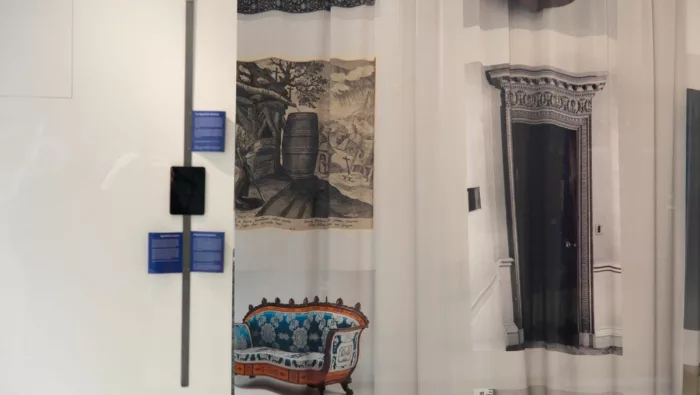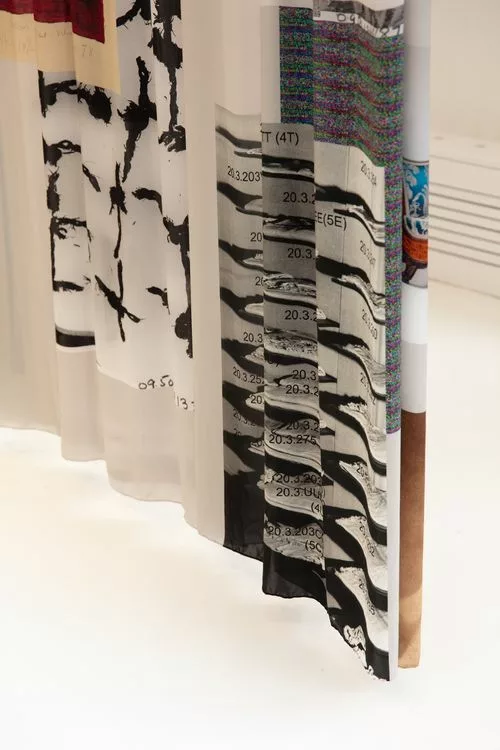
Dr Laura Herman
Former MSc Student
Laura specializes in emerging technologies’ impact on artistic & creative practices.

The Algorithmic Pedestal was an exhibit held from January 11-17th, 2023 at J/M Gallery in London. It constituted an exhibit-based research project showcasing images curated by London-based artist Fabienne Hess alongside images curated by Instagram.

The Algorithmic Pedestal showcased the differences between human and machine ways of seeing. Drawing on the Metropolitan Museum of Art’s Open Access collection, both a human artist and an algorithmic system were invited to select images for the exhibit. Sorting through thousands of images, they each chose 20-30 images to display in a particular order and layout.
Visitors to the exhibit were invited to compare and reflect on the differences in algorithmic and human curation decisions in questionnaires, surveys, and interviews.

The researchers captured Instagram’s curatorial decisions by uploading 800 images from the Metropolitan Museum of Art’s Open Access collection to a new Instagram account: @thealgorithmicpedestal. At the time, this account was followed only by one other account (@following_algorithmicpedestal).
Visiting the Home feed of the following account, the researchers saw which images Instagram chose to display from @thealgorithmicpedestal and in which order. No captions, metadata, or social information was provided, such that the algorithmic curation was determined only based on the image itself.

Conversely, artist Fabienne Hess elected to select images that correspond to a concept: loss. Hess believes that loss is a uniquely—and universally—human experience, inescapable in human lives.
Hess’ curatorial process is driven by the human experiences of time, curiosity, and patience; she has spent years physically exploring collections in an embodied fashion, learning about each object’s stories and photographing them during site visits. In this way, Hess’ curation represents both a very human process and a very human selection criteria.
The exhibit received over 500 visitors, who were encouraged to consider the differences between machine curation and a human’s curation. As an increasing proportion of our visual ecology is mediated by algorithmic platforms (such as Instagram, TikTok, Twitter, etc.), The Algorithmic Pedestal provided a space to urgently consider algorithms’ impact on visual society and cultural norms.
This exhibit is part of Laura Herman’s PhD at the University of Oxford’s Internet Institute, supported by the UK’s Arts & Humanities Research Council. This exhibit has been funded by the Oxford-Minderoo AI Challenge Fund.
Researchers:
Dr. Caterina Moruzzi
Dr. Kathryn Eccles
Laura Herman
Contributors:
Fabienne Hess
James Williamson
J/M Gallery
Motong Yang
Oxford Internet Institute
Oxford-Minderoo AI Challenge Fund
Parasite 2.0
Silk Bureau
Weezy Dai
Photos by Parasite 2.0

Former MSc Student
Laura specializes in emerging technologies’ impact on artistic & creative practices.

Deputy Director, Associate Professor, Senior Research Fellow
Kathryn Eccles has research interests in the impact of new technologies on Humanities scholarship, and the re-organisation of cultural heritage and higher education in the digital world.

“AI can’t come for creativity because that’s an inherently human act”, says Laura Herman, a researcher at the Oxford Internet Institute. However, the rise of AI technologies such as ChatGPT and Midjourney has questioned whether that is actually true

PC Magazine, 24 April 2024
Machine learning researchers at Stanford have developed an innovative way to moderate online content—one that could potentially make the web less polarizing and divisive.

BBC Radio 4, 27 February 2023
Algorithms are not just changing how we create art, they’ve been curating everything we see and hear online for years.

New Scientist, 07 February 2023
Watch the New Scientist interview with OII doctoral researcher Laura Herman talking about her goals and motivations behind The Algorithmic Pedestal exhibition and research project.

Forbes, 24 January 2023
Earlier this year OpenAI released ChatGPT, which showcased the ability of AI to write text, tell stories, and code to a pretty decent degree. The Algorithmic Pedestal' offered a more traditional take on AI-driven curation.
